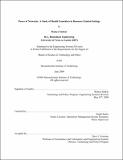Power of networks : a study of health franchises in resource limited settings
Author(s)
Sankar, Ramya
DownloadFull printable version (2.629Mb)
Alternative title
Study of health franchises in resource limited settings
Other Contributors
Massachusetts Institute of Technology. Technology and Policy Program.
Advisor
Anjali Sastry.
Terms of use
Metadata
Show full item recordAbstract
Billions of dollars are spent to develop drugs for infectious diseases in developing countries. How will these drugs along with clinical services be delivered to the patients who currently do not have access to them? Health franchises have been around since early 1990s, creating networks of shops and clinics that provide specialized care to low income individuals. This thesis attempts to understand the underlying mechanisms of successful health franchises. Two cases are taken into consideration, CFWshops in Kenya and Mi Farmacita Nacional (MFN) in Mexico. Both are pharmaceutical shops with small clinics attached to them. The two cases were examined through a framework derived from successful commercial franchises and franchise theory. The elements that were addressed include operational structure, marketing strategy, product and service offerings, monitoring of businesses, and financial structure. CFWshops and MFN had some stark differences in how they addressed each of these elements. Unlike typical commercial franchises, health franchises aim to provide social benefits to the population. This goal requires franchises to not only create a business strategy to be financially sustainable and take advantage of networks, but also show health improvements in the community. The success of a health franchise is dependent on the health impacts it provides because its mission is not to generate a profit for the stakeholders but rather the value added to the customer by providing access that was not there before. (cont.) The comparative case analysis suggests several key recommendations. Health innovations in resource limited settings should create networks with other public and private health groups to leverage existing knowledge and best practices. This reduces cost and time of learning and allows businesses to utilize existing channels to provide access for drugs and services to individuals who currently are not receiving them.
Description
Thesis (S.M. in Technology and Policy)--Massachusetts Institute of Technology, Engineering Systems Division, Technology and Policy Program, 2009. This electronic version was submitted by the student author. The certified thesis is available in the Institute Archives and Special Collections. Cataloged from student submitted PDF version of thesis. Includes bibliographical references (p. 62-64).
Date issued
2009Department
Massachusetts Institute of Technology. Engineering Systems Division; Technology and Policy ProgramPublisher
Massachusetts Institute of Technology
Keywords
Engineering Systems Division., Technology and Policy Program.